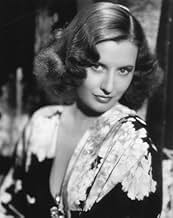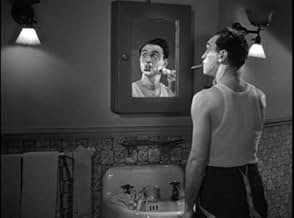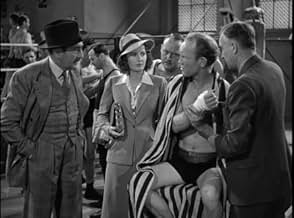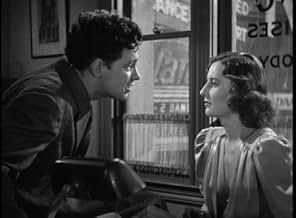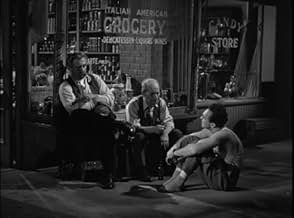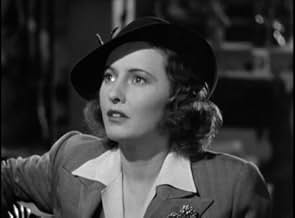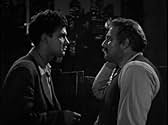IMDb रेटिंग
6.8/10
2.3 हज़ार
आपकी रेटिंग
अपनी भाषा में प्लॉट जोड़ेंA poor young Italian man, who is a virtuoso on the violin, wishes to become a champion boxer to make a fortune for his family. But what is the road to success and happiness, and what is the ... सभी पढ़ेंA poor young Italian man, who is a virtuoso on the violin, wishes to become a champion boxer to make a fortune for his family. But what is the road to success and happiness, and what is the price?A poor young Italian man, who is a virtuoso on the violin, wishes to become a champion boxer to make a fortune for his family. But what is the road to success and happiness, and what is the price?
- 1 ऑस्कर के लिए नामांकित
- 1 जीत और कुल 1 नामांकन
Edward Brophy
- Roxy Lewis
- (as Edward S. Brophy)
Charles Halton
- Newspaperman
- (काटे गए सीन)
Stanley Andrews
- Driscoll - Fight Official
- (बिना क्रेडिट के)
Gordon Armitage
- Fighter
- (बिना क्रेडिट के)
Earl Askam
- Policeman
- (बिना क्रेडिट के)
Don Brodie
- Reporter
- (बिना क्रेडिट के)
Mushy Callahan
- Fight fan
- (बिना क्रेडिट के)
Dora Clement
- Ill Ringsider Who Won't Leave
- (बिना क्रेडिट के)
फ़ीचर्ड समीक्षाएं
Clifford Odets' play about a musician turned boxer was a natural for Hollywood, which has always loved boxing movies. Perhaps subliminally, Odets was inspired by the Fannie Hurst "Humoresque," first made into a film in 1920.
When "Golden Boy" was done in 1938 as a production of the Group Theater, John Garfield hoped to play the role of Joe Bonaparte and was disappointed when the lead went instead to Luther Adler, with Garfield relegated to the role of Siggie.
Garfield rectified this in 1952 when he played the lead on Broadway and also had his chance to play a boxer in "Body and Soul" and a violinist in "Humoresque." Tony Curtis is another who did the part of Joe as a young actor before going to Hollywood.
There are two ways of casting this role - the Garfield way - the streetwise fighter who happens to be a gifted violinist, or the reverse - the gentle violinist who just happens to be a gifted fighter. The latter is more interesting, as the audience is then able to see how the fight world changes an artistic soul.
Columbia took this route and chose 27-year-old Richard Carlson for the role, but he was appearing on Broadway at the time. After testing nearly everyone, the studio put 21-year-old William Holden in the role. His was a new face and a pretty one - he certainly didn't look like a fighter.
A part like this for someone who had two uncredited film appearances had to have been like winning Scarlett O'Hara and just as daunting; were it not been for the help and intervention of Barbara Stanwyck, who played Lorna (originally done on stage by Frances Farmer) Holden would have been fired.
The theme of following your heart, so often explored by Eugene O'Neill, is another overriding theme in this story, with the character of Joe Bonaparte torn between his love for playing the violin and the appeal of making money as a fighter and being somebody.
Joe comes from an immigrant family who all live together - seen so often in films from the '30s and '40s -- again, "Humoresque" comes to mind. This immediately dates the film and puts it right into its period.
The other thing that dates it is the over the top performance of Lee J. Cobb as Joe's dad. Cobb was in the original play on Broadway but as another character; he would repeat his role as the father in the Garfield production. Undoubtedly this characterization worked better on stage and definitely worked better for a '30s audience.
William Holden gives a tender performance as Joe, an artist at heart who falls for his manager's girlfriend. Like Glenn Ford, he had one of those faces that changed so totally that he isn't even recognizable as William Holden in this film - even his voice is different.
He's young, beautiful, with an unlined face and a higher voice. His performance opened up light leading man roles for him. It wasn't until 1950 that he had his second breakthrough film, "Sunset Boulevard" - which vaulted him into superstardom. That William Holden was virile, rugged, and handsome. It's an amazing transformation.
Stanwyck is perfect as Lorna Moon - tough, sexy, and a marshmallow underneath. Her chemistry with Holden is excellent. He never forgot how much she helped him, and sent her roses each time she started a new film.
"Golden Boy" was turned into a Broadway musical as well - there's something enduring about the story of a man's struggle to find his true destiny. This is as good an example of that struggle as you'll find anywhere.
When "Golden Boy" was done in 1938 as a production of the Group Theater, John Garfield hoped to play the role of Joe Bonaparte and was disappointed when the lead went instead to Luther Adler, with Garfield relegated to the role of Siggie.
Garfield rectified this in 1952 when he played the lead on Broadway and also had his chance to play a boxer in "Body and Soul" and a violinist in "Humoresque." Tony Curtis is another who did the part of Joe as a young actor before going to Hollywood.
There are two ways of casting this role - the Garfield way - the streetwise fighter who happens to be a gifted violinist, or the reverse - the gentle violinist who just happens to be a gifted fighter. The latter is more interesting, as the audience is then able to see how the fight world changes an artistic soul.
Columbia took this route and chose 27-year-old Richard Carlson for the role, but he was appearing on Broadway at the time. After testing nearly everyone, the studio put 21-year-old William Holden in the role. His was a new face and a pretty one - he certainly didn't look like a fighter.
A part like this for someone who had two uncredited film appearances had to have been like winning Scarlett O'Hara and just as daunting; were it not been for the help and intervention of Barbara Stanwyck, who played Lorna (originally done on stage by Frances Farmer) Holden would have been fired.
The theme of following your heart, so often explored by Eugene O'Neill, is another overriding theme in this story, with the character of Joe Bonaparte torn between his love for playing the violin and the appeal of making money as a fighter and being somebody.
Joe comes from an immigrant family who all live together - seen so often in films from the '30s and '40s -- again, "Humoresque" comes to mind. This immediately dates the film and puts it right into its period.
The other thing that dates it is the over the top performance of Lee J. Cobb as Joe's dad. Cobb was in the original play on Broadway but as another character; he would repeat his role as the father in the Garfield production. Undoubtedly this characterization worked better on stage and definitely worked better for a '30s audience.
William Holden gives a tender performance as Joe, an artist at heart who falls for his manager's girlfriend. Like Glenn Ford, he had one of those faces that changed so totally that he isn't even recognizable as William Holden in this film - even his voice is different.
He's young, beautiful, with an unlined face and a higher voice. His performance opened up light leading man roles for him. It wasn't until 1950 that he had his second breakthrough film, "Sunset Boulevard" - which vaulted him into superstardom. That William Holden was virile, rugged, and handsome. It's an amazing transformation.
Stanwyck is perfect as Lorna Moon - tough, sexy, and a marshmallow underneath. Her chemistry with Holden is excellent. He never forgot how much she helped him, and sent her roses each time she started a new film.
"Golden Boy" was turned into a Broadway musical as well - there's something enduring about the story of a man's struggle to find his true destiny. This is as good an example of that struggle as you'll find anywhere.
This is a wonderful, compelling, emotionally charged movie, with characters that are both interesting and likable. Of course, the central character of the movie is Joe Bonaparte, played by a young, gifted actor named William Holden. Joe's conflict, between his quest for fame as a prize fighter and his father's wish to become a concert violinist, although seemingly corny and contrived, actually works in this movie. And this can be attributed to the fine acting of all the players - Barbara Stanwyck, Lee J. Cobb, Adolph Menjou, and William Holden - who prove that high quality acting can transform a good script into a great script. One particularly intense scene is when Joe tries to play the violin - and he can't, leaving him devastated in the knowledge that he had squandered a gift and in the process had disappointed his father. This is a movie that is worth the time to watch and to enjoy.
While 1939 has been properly established as a year of many exceptional films of the American cinema, my favorite actor, Miss Barbara Stanwyck, starred in two: The DeMille epic UNION PACIFIC, and this Clifford Odets' play-turned-movie, GOLDEN BOY. While this film is usually recognized as the one that made William Holden a star, equally famous is the story of how he would have been fired from the film during production had it not been for veteran Stanwyck sticking up for him, insisting that they give him a chance, and then helping him to be a success. There were no shortages of established leading men waiting in the wings for this coveted role, so Barbara's unselfish act forged a life-long relationship between them for which Holden thanked her with a gift of roses each year on the anniversary of the film's opening. In one review, Richard Corliss writes, "...Stanwyck godmothered the young William Holden to stardom and earned his lifelong devotion." I'm sure this real life teacher/student relationship is also mirrored in the actual drama that unfolds on the screen. In spite of their difference in age, however, it's not as vast as the Holden/Swanson relationship in SUNSET BOULEVARD, and the chemistry on Golden Boy is more evenly matched and more appealing. Furthermore, the supporting cast of Aldophe Menjou, as the boxing manager, Lee J. Cobb as Holden's dad, and Sam Levene as Holden's brother-in-law is so tightly woven that the movie has all the charm and intensity of the Broadway play on which it is based. A memorable line that Stanwyck delivers when she is luring the golden violin prodigy from practicing his scales to make some extra dough on the side as a prizefighter is, "...you take a chance the day you are born, so why stop now?" When he doesn't at first take the bait, watch out for the dated line, "I'll see you in 1966 when, by then, you may have become somebody..." Of course, thanks to Barbara, it happened in 1939. This is an extremely satisfying film suitable for the whole family.
A great film. A (very) young William Holden "hits" the bulls-eye on this one. And, I always love to see Barbara Stanwyck's hard, street smart "heart of stone" turn to mush. In a story that won't present you with many surprises as it unfolds, this film is held together by many fine performances. It's from that magical time, long ago, when New York City was inhabited by hustlers and gangsters and boxing was king. It was also inhabited by those of strong family values, the ones fighting that constant battle of the "easy" way or the right way. The mainstay, in that era (in film, anyway), was the ultimate triumph of good. Here, it is a joy to behold. The right choices, by both Stanwyck and Holden, seem very apparent to the viewer, but the right choices are rarely the first ones taken.
Eventually, they can be taken......
Eventually, they can be taken......
Well-written and well-acted vehicle serves as William Holden's entree to stardom. He was just 21 and is easier to recognize in his opening scene by his voice rather than his boyish looks and longish hair. Regardless of what it took to get him to give this performance, it is one that will be long remembered. Barbara Stanwyck plays the tough cookie who discovers she has a heart of gold, reminiscent of her role later perfected in "Meet John Doe." When asked if she was Adolphe Menjou's girl, Barbara replies "I'm my mother's girl." Great cast of supporting character actors add to enjoyment of a solid production whose best scenes involve family and not the ring. Good camera work, especially of those fight scenes, excellent sets, and great direction make this a surprisingly good night's entertainment. I avoided it for years thinking this was just another fight movie -- it is not -- and am now sorry that I waited.
क्या आपको पता है
- ट्रिवियाWilliam Holden was so grateful to Barbara Stanwyck for her insistence on casting him in Golden Boy (1939), his first big role, that he reportedly sent her flowers every year on the anniversary of the first day of filming.
- गूफ़Joe's chest is completely smooth during the big fight. Immediately after the fight, when he is dressed, he has chest hair visible at the top of his shirt.
- भाव
Eddie Fuseli: This your girl?
Lorna Moon: I'm my mother's girl.
- इसके अलावा अन्य वर्जनA video version in Argentina was lifted from a 16mm print from Columbia Pictures, in English with Spanish language subtitles. The credits of this version are translated in Spanish.
- साउंडट्रैकWe're in the Money Now
Sung a cappella by Adolphe Menjou to the tune of the traditional
nursery rhyme "The Farmer in the Dell"
टॉप पसंद
रेटिंग देने के लिए साइन-इन करें और वैयक्तिकृत सुझावों के लिए वॉचलिस्ट करें
- How long is Golden Boy?Alexa द्वारा संचालित
विवरण
- रिलीज़ की तारीख़
- कंट्री ऑफ़ ओरिजिन
- भाषा
- इस रूप में भी जाना जाता है
- Zlatan decko
- फ़िल्माने की जगहें
- Eighth Avenue and 50th Street, मैनहटन, न्यूयॉर्क शहर, न्यूयॉर्क, संयुक्त राज्य अमेरिका(Madison Square Garden, located at the West side of 8th Avenue from 1925 to 1968)
- उत्पादन कंपनी
- IMDbPro पर और कंपनी क्रेडिट देखें
- चलने की अवधि
- 1 घं 39 मि(99 min)
- रंग
- पक्ष अनुपात
- 1.37 : 1
इस पेज में योगदान दें
किसी बदलाव का सुझाव दें या अनुपलब्ध कॉन्टेंट जोड़ें

